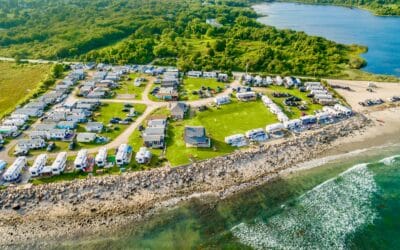Golf course properties are hot targets for investors — and prices are soaring
South Florida Business Journal - By Andy Medici – Senior Reporter, The Playbook, The Business Journals
Read The Business Journals Article

In early 2024 Concert Golf Partners acquired The Club at Pasadera in California for nearly $10 million — adding it to a collection of golf clubs now numbering 33 across the country.
The 6,673-yard, par-71 golf course designed by golf legend Jack Nicklaus also comes with a pool, wedding venue and a five-bedroom lodge for executive retreats and family gatherings.
In December 2023, McRae Industries Inc., through its wholly owned subsidiary, agreed to sell 262 acres of its Berkeley Country club for $2.65 million. In late February, the Gainesville Country Club sold at auction for just over $2 million, while the three-course Pinewild Country Club of Pinehurst, North Carolina, sold for roughly $20 million.
More acquisitive golf and country club-related companies are buying up properties at a larger scale, too. Invited Inc.’s CEO told The Playbook in 2023 it was aiming to buy three or four properties a year to rehab and add to its growing portfolio. Arcis Golf — backed by Fortress Investment Group LLC and Atairos — outlined its goal to build and maintain a dense network of clubs for its subscription-paying members.
After nearly a decade near industry lows, the resurgence of golf and its continuing popularity has once again pushed country clubs to the top of the list for people and companies itching to invest in different types of real estate.
“I would tell you today that we have 66% more buyers in the market for golf assets than we had four years ago,” said Steven Ekovich, executive managing director and partner at Leisure Investment Properties Group, which helps buy and sell country clubs and other hospitality-related properties. “What has spurred that is the health of the golf industry.”
Not every club has been able to make it through the demographic and financial gambit of the last decade. Thousands of clubs have closed since the Great Recession, with some former golf courses turned into developments or simply lying unused, the subject of intense community debate.
But the industry has largely turned a corner. The number of “on-course” golfers grew once more in 2023 to 25.6 million, according to data from the National Golf Foundation, while “off-course” golfers playing at driving rangers or virtual setups grew as well to 27.9 million. Meanwhile, the enhanced demand has meant fewer golf course closures, with the expectation that courses start growing again in the coming years.
In 2023, LIPG tracked the sales of individual golf courses (excluding larger resort and portfolio sales) and found the average sale price to be nearly $5 million, a 20.6% jump over 2022. The median sale price, however, was down slightly to $2.5 million — although still far above the roughly $1.5 million from 2019.
But the group expects more investors to keep chasing deals. Why? Because golf courses and country clubs, with their multiple potential lines of profit from the golf itself, associated restaurants and facilities, also come with built-in revenue in the form of monthly dues and fees — a revenue model prized by investors.
And waitlists, which have grown substantially in recent years and show no sign of shrinking, showcase the pent-up demand for these courses over the long term, Ekovich said.
That has attracted investors with big pockets, too.
“Private equity is now involved in every major owner, and 10 years ago it was just one owner,” Ekovich said. “These golf courses are more valuable because you can see a de-risked income stream into the future because of these waiting lists. These investors are saying, ‘Wow this looks like a pathway to increased earnings.'”
But another reason is because apartment buildings and office space has become far less attractive an investment. Even as employers push workers to return to their offices and building owners pull out the stops to raise occupancy, it’s clear that to some extent technology has made that kind of space obsolete.
“You can make an argument that with urban office towers there is some functional obsolescence gong on,” Ekovich said. “You have the ability to communicate instantly around the world without being in an office.”
That has also held true for retail space to some extent, he added, as Amazon grabbed a large share of sales online without any physical retail space and while forcing companies to compete with the prices it sets. That has forced down the yields that property owners have been able to squeeze out of these spaces, and he has already helped several owners of apartment buildings, retail spaces and offices find a country club to purchase.
That is a huge reversal from five years ago, when the hottest transaction involving golf courses was to sell them to a developer intending to build homes on the acres of green space, he said.
“The other asset types that are struggling are forcing investors to find yield and they are finding it in the golf space,” Ekovich said.
But even as technology has come online in the form of virtual golfing experiences or driving ranges, it won’t be able to replace the real-world desire to play a round of golf on a golf course — it will only feed that desire and enhance it. He pointed to technology that allows people to measure their swings and track their balls as an example.
“Technology is not going to make golf courses functionally obsolete,” Ekovich said. “Technology in golf will only enhance the experience.”
Meanwhile, the fragmented nature of the golf course market — roughly 14,000 courses with 80% or so owned by individual operators — means there is plenty of room for larger owners and investors to build a portfolio, Ekovich said. Larger ownership groups can buy goods in bulk and can use buying power to force down prices, while creating a management staff that can operate a number of courses with minimal disruptions.
“You will continue to see consolidation in the golf market,” Ekovich said, adding larger groups are also better at raising revenue and earnings beyond just selling items at a pro shop. “It is very difficult to compete in the market because you are paying retail for everything and you don’t have core competencies.”
While higher interest rates have hurt other industries through higher borrowing costs, that has not materially impacted the golf course and country club industry, according to Cary Lannin, director at IRR-Chicago, in a recent report.
“The strong underlying fundamentals of golf have led to increased investor interest in the industry,” Lannin said, adding that the only thing holding buyers back is that owners no longer are as interested in selling. “This is largely due to a lack of available inventory since owners –– faced with the increase in bottom line EBITDA post-pandemic –– aren’t motivated to sell.”
List Your Golf Course,
Let Us Do The Rest!
Whether your golf course, golf MPC, or golf resort is worth $1M or $50M, we treat your property and business as if it is worth $100M. Our white-glove approach enables you to continue operating your business without interruptions from the headaches, negotiations, or stressful back-and-forth with investors. We are your partner throughout the entire process.

Related
Related News & Updates
Supporting the Community During Hard Times
Supporting the Community During Hard Times After the damage caused by Hurricane Helen and Hurricane Milton, Leisure Investment Properties Group (LIPG) stepped up to help their community by donating to Positive Impact Ministries in St. Petersburg, Florida. This...
Is Investing in RV Parks a Good Idea?
Is Investing in RV Parks a Good Idea? The RV park industry has emerged as one of the most stable and promising investment opportunities in recent years, particularly due to shifts in travel behavior and market demand. Once viewed as a niche market, RV parks...
Commercial Capital Costs Continue to Drop
Capital Markets update from Greg Lewis on 50 basis points reduction. Borrowing costs for commercial real estate has come down materially in Q3 and the future looks good. Let’s hope the capital markets continue to stay ahead of any further deterioration of jobs...
Contact
17539 Darby Lane | Tampa, FL | 33558
(813) 269-1144



